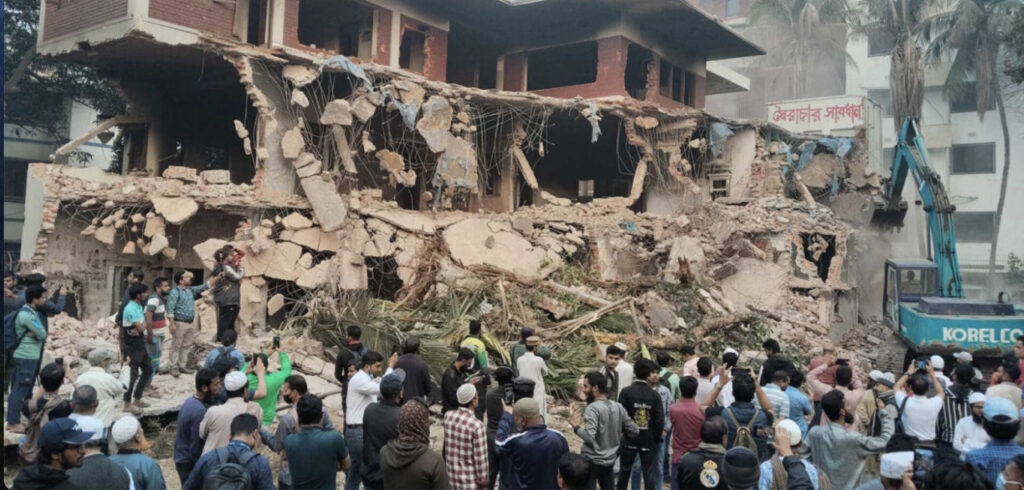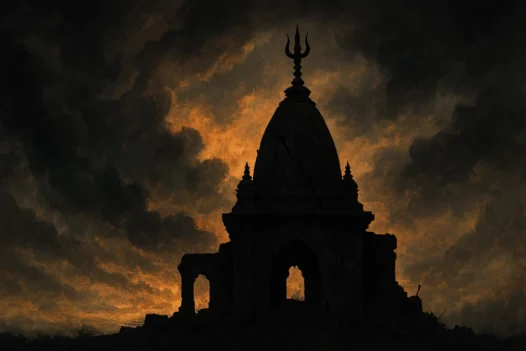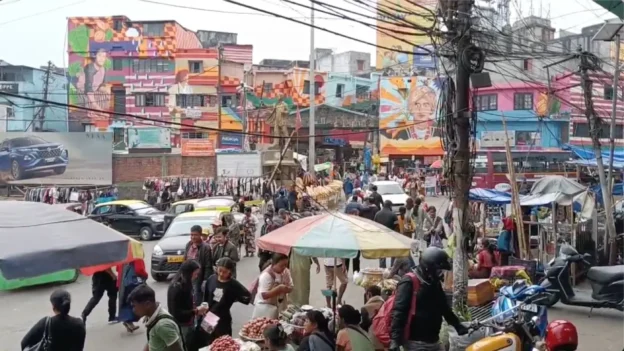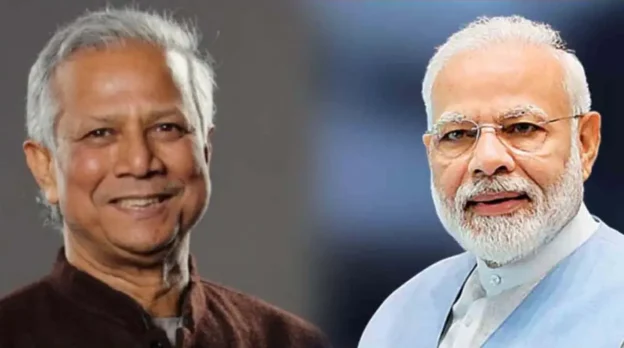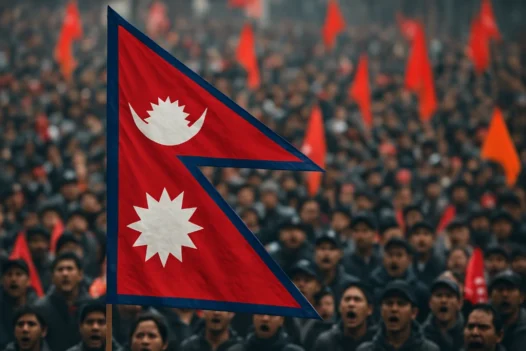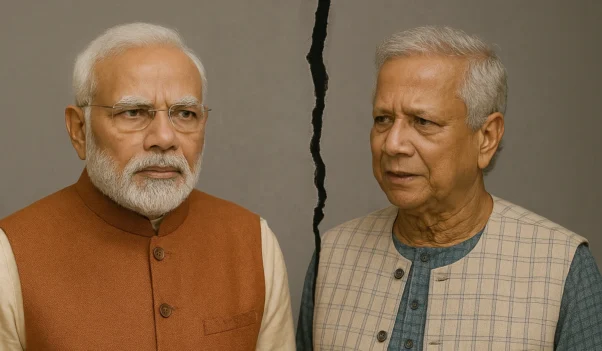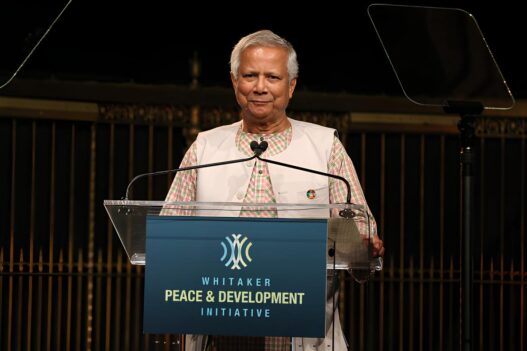The recent turmoil in Bangladesh has laid bare the troubling contradictions in the interim government’s response to escalating violence. Since the attack on Dhanmondi 32—the historic residence of Sheikh Mujibur Rahman—on the night of 5 February, the country has witnessed a wave of destruction targeting properties linked to the Awami League. Yet, the government’s reaction raises pressing concerns: why does it remain a silent spectator as vandals run amok, while swiftly cracking down on those who attempt to resist such anarchy?
For many who cherish Bangladesh’s history and its struggle for freedom, the attack on Dhanmondi 32 was more than just an act of vandalism—it was an assault on the nation’s legacy. The outrage it sparked was inevitable. Clashes erupted as citizens attempted to confront the mobs wreaking havoc, resulting in injuries on both sides. Yet, instead of ensuring an impartial response, the government swiftly branded those resisting the violence as ‘terrorists,’ while displaying little urgency in holding the perpetrators of the destruction accountable. This selective approach raises troubling questions: why does the state hesitate to act against those who instigate chaos, yet swiftly suppresses those who attempt to stop the wanton destruction of historical and political landmarks?
Reports suggest that a mix of students, anti-Awami League political activists, and radical elements have been systematically targeting homes and properties, yet law enforcement has largely remained passive. However, when resistance emerged, the government responded with force. On 9 February, at least 14 individuals—reportedly part of the mobs targeting Awami League properties—were injured in Gazipur as clashes broke out. While the true identities and motivations of these attackers remain unclear, conflicting narratives have emerged—some label them ‘robbers,’ others dismiss them as mere opportunists, while government voices have gone so far as to call them ‘devils.’ From the unfolding events, it appears that these individuals were primarily resisting the so-called protesters from vandalising historic properties and the homes of Awami League leaders. However, the real motive behind their actions must be fully understood before drawing conclusions.
There can be no justification for violence—whether it comes from the mobs that have terrorised Awami League supporters or those who fought back against them. Law enforcement must act with an even hand. Yet, the government’s actions suggest a selective approach to justice. The launch of ‘Operation Devil Hunt’ by the Bangladesh government on February 10 has predominantly targeted Awami League leaders and supporters, with media reports confirming the arrest of several party officials, including presidents and secretaries of different units. Even high-ranking members of the police force, such as a deputy inspector general and three superintendents, were detained before the operation commenced. This raises troubling questions: is the interim government truly committed to restoring order, or is it using the unrest as a pretext to dismantle the political structures of the former ruling party?
Media reports quoting Home Affairs officials have sought to justify the operation by portraying it as a crackdown on forces destabilising the country. However, if that is truly the objective, why are those who orchestrated the vandalism on Dhanmondi 32 and other Awami League properties not facing equal scrutiny? Many among them have affiliations with the Bangladesh Nationalist Party (BNP), Jamaat-e-Islami, and radical groups with documented histories of political violence, corruption, and heinous crimes. Should they not be held equally accountable? If the interim government is genuinely concerned about stability, then its responsibility extends beyond targeting one political faction. Justice cannot be applied selectively.
The government’s stance has been further complicated by its reluctance to condemn the attacks with the forcefulness they warrant. Instead of making a decisive stand against the destruction of Bangladesh’s historical sites and political offices, it has chosen to focus its rhetoric elsewhere. Following the attack on Dhanmondi 32, the administration issued a lukewarm statement urging restraint, while simultaneously accusing Sheikh Hasina of provoking unrest through her remarks in India. In a puzzling move, the government even attempted to drag India into Bangladesh’s internal conflict, a claim that New Delhi strongly rejected.
India’s Ministry of External Affairs (MEA) summoned Bangladesh’s envoy to express its displeasure, making it clear that Sheikh Hasina’s speech reflected her personal position, not that of the Indian government. By shifting the narrative in this manner, is the interim leadership seeking to divert attention from its own failure to restore order? Should it not be focusing on addressing the actual agents of chaos within its borders, rather than seeking external scapegoats?
Mobs have attacked supporters of the deposed prime minister, vandalised homes and businesses, and spread violence across multiple districts. Some reports estimate that at least 70 attacks have occurred in 35 districts since 7 February. Yet, the government’s response remains glaringly uneven. If Sheikh Hasina was ousted for her increasing authoritarianism, does that justify a free rein for other political forces with equally troubling histories? If accountability is the objective, then why is there no equivalent operation to rein in those who are openly destabilising Bangladesh today?
Ultimately, Bangladesh stands at a crossroads. The government’s failure to act decisively against all forms of violence risks deepening divisions and undermining its own credibility. If it continues to turn a blind eye to one side while punishing the other, it will only invite further unrest. Justice must be applied without bias, and history cannot be rewritten through selective crackdowns. If the interim government truly seeks stability, it must enforce law and order impartially—anything less will only deepen the crisis.

